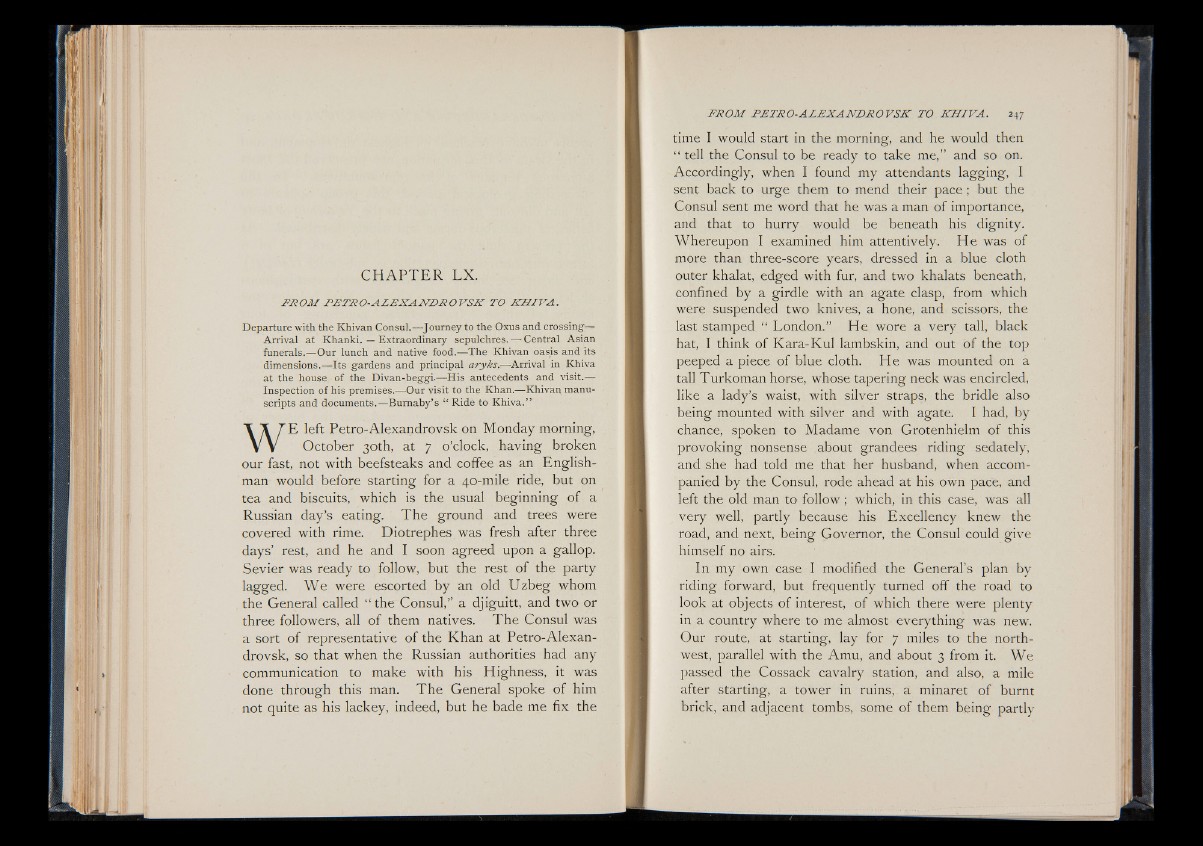
C H A P T E R LX.
FROM P E TR O -A L E X A N D R O V SK TO KH IV A .
Departure with the Khivan Consul.—Journey to the Oxus and crossing—
Arrival at Khanki. — Extraordinary sepulchres. — Central Asian
funerals.-SOur lunch and native food.—The Khivan oasis and its
dimensions.— Its gardens and principal Arrival in Khiva
at the house of the Divan-beggi.—His antecedents and visit.—
Inspection of his premises.— Our visit to the Khan.—Khivan manuscripts
and documents.— Burnaby’s “ Ride to Khiva.”
WE left Petro-Alexandrovsk on Monday morning,
October 30th, at 7 o’clock, having broken
our fast, not with beefsteaks and coffee as an Englishman
would before starting for a 40-mile ride, but on
tea and biscuits, which is the usual beginning of a
Russian day’s eating. T h e ground and trees were
covered with rime. Diotrephes was fresh after three
days’ rest, and he and I soon agreed upon a gallop.
Sevier was ready to follow, but the rest of the party
lagged. W e were escorted by an old Uzbeg whom
the General called “ the Consul,” a djiguitt, and two or
three followers, all of them natives. T h e Consul was
a sort of representative of the Khan at Petro-Alexandrovsk,
so that when the Russian authorities had any
communication to make with his Highness, it was
done through this man. T he General spoke of him
not quite as his lackey, indeed, but he bade me fix the
time I would start in the morning, and he would then
“ tell the Consul to be ready to take me,” and so on.
Accordingly, when I found my attendants lagging, I
sent back to urge them to mend their pace ; but the
Consul sent me word that he was a man of importance,
and that to hurry would be beneath his dignity.
Whereupon I examined him attentively. He was of
more than three-score years, dressed in a blue cloth
outer khalat, edged with fur, and two khalats beneath,
confined by a girdle with an agate clasp, from which
were suspended two knives, a hone, and scissors, the
last stamped “ London.” H e wore a very tall, black
hat, I think of Kara-Kul lambskin, and out of the top
peeped a piece of blue cloth. He was mounted on a
tall Turkoman horse, whose tapering neck was encircled,
like a lady’s waist, with silver straps, the bridle also
being mounted with silver and with agate. I had, by
chance, spoken to Madame von Grotenhielm of this
provoking nonsense about grandees riding sedately,
and she had told me that her husband, when accompanied
by the Consul, rode ahead at his own pace, and
left the old man to follow ; which, in this case, was all
very well, partly because his Excellency knew the
road, and next, being Governor, the Consul could give
himself no airs.
In my own case I modified the General’s plan by
riding forward, but frequently turned off the road to
look at objects of interest, of which there were plenty
in a country where to me almost everything was new.
Our route, at starting, lay for 7 miles to the northwest,
parallel with the Amu, and about 3 from it. We
passed the Cossack cavalry station, and also, a mile
after starting, a tower in ruins,, a minaret of burnt
brick, and adjacent tombs, some of them being partly